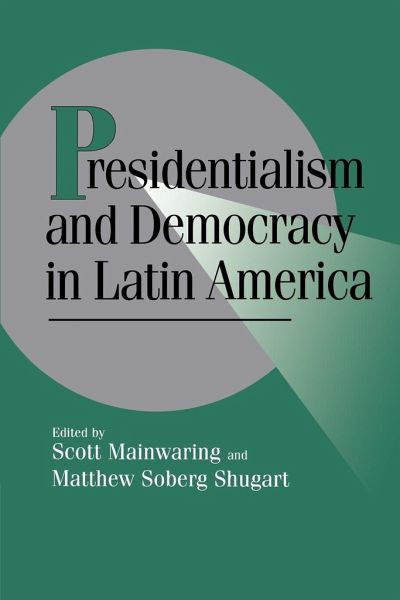
Presidentialism and Democracy in Latin America
Versandkostenfrei!
Versandfertig in 1-2 Wochen
56,99 €
inkl. MwSt.

PAYBACK Punkte
28 °P sammeln!
This book addresses the current debate regarding the liabilities and merits of presidential government. Does presidentialism make it less likely that democratic governments will be able to manage political conflict, as many prominent scholars have argued? With the unprecedented wave of transitions to democracy since the 1970s, this question has been hotly contested in political and intellectual circles all over the globe. The contributors to this volume examine variations among different presidential systems and sceptically view claims that presidentialism has added significantly to the proble...
This book addresses the current debate regarding the liabilities and merits of presidential government. Does presidentialism make it less likely that democratic governments will be able to manage political conflict, as many prominent scholars have argued? With the unprecedented wave of transitions to democracy since the 1970s, this question has been hotly contested in political and intellectual circles all over the globe. The contributors to this volume examine variations among different presidential systems and sceptically view claims that presidentialism has added significantly to the problems of democratic governance and stability. The contributors argue that presidential systems vary in important ways, mostly according to the constitutional powers accorded to the president to affect legislation and the degree to which presidents' parties control legislative majorities.
Table of contents:
Preface; 1. Presidentialism and democracy in Latin America: rethinking the terms of the debate Matthew Soberg Shugart and Scott Mainwaring; 2. Dilemmas of multi-party presidential democracy: the case of Brazil Scott Mainwaring; 3. The unrealized potential of presidential dominance in Columbia Ronald P. Archer and Matthew Soberg Shugart; 4. Presidential behavior in a system with strong parties: Venezuala 1958-1995 Brian F. Crisp; 5. Strong candidates for a limited office: Presidentialism and political parties in Costa Rica John M. Carey; 6. The logic of Presidencialismo in Mexico Jeffrey Weldon; 7. Evaluating Argentina's presidential democracy: 1983-1995 Mark P. Jones; 8. In defense of Presidentialism: the case of Chile 1932-1970 Julio Faundez; 9. Executive-legislative relations in Post-Pinochet Chile: a preliminary assessment Peter M. Siavelis; 10. Hybrid-Presidentialism and democratization: the Case of Bolivia Eduardo Gamarra; 11. Conclusion: presidentialism and the party system Scott Mainwaring and Matthew Soberg Shugart; Appendix: outlines of constitutional powers in Latin America John M. Carey, Octavio Amorim Neto and Matthew Soberg Shugart.
This book addresses the current debate regarding the liabilities and merits of presidential government. Does presidentialism make it less likely that democratic governments will be able to manage political conflict? The contributors to this volume examine variations among different presidential systems and skeptically view claims that presidentialism has added significantly to the problems of democratic governance and stability.
This book addresses the current debate regarding the liabilities and merits of presidential government.
Table of contents:
Preface; 1. Presidentialism and democracy in Latin America: rethinking the terms of the debate Matthew Soberg Shugart and Scott Mainwaring; 2. Dilemmas of multi-party presidential democracy: the case of Brazil Scott Mainwaring; 3. The unrealized potential of presidential dominance in Columbia Ronald P. Archer and Matthew Soberg Shugart; 4. Presidential behavior in a system with strong parties: Venezuala 1958-1995 Brian F. Crisp; 5. Strong candidates for a limited office: Presidentialism and political parties in Costa Rica John M. Carey; 6. The logic of Presidencialismo in Mexico Jeffrey Weldon; 7. Evaluating Argentina's presidential democracy: 1983-1995 Mark P. Jones; 8. In defense of Presidentialism: the case of Chile 1932-1970 Julio Faundez; 9. Executive-legislative relations in Post-Pinochet Chile: a preliminary assessment Peter M. Siavelis; 10. Hybrid-Presidentialism and democratization: the Case of Bolivia Eduardo Gamarra; 11. Conclusion: presidentialism and the party system Scott Mainwaring and Matthew Soberg Shugart; Appendix: outlines of constitutional powers in Latin America John M. Carey, Octavio Amorim Neto and Matthew Soberg Shugart.
This book addresses the current debate regarding the liabilities and merits of presidential government. Does presidentialism make it less likely that democratic governments will be able to manage political conflict? The contributors to this volume examine variations among different presidential systems and skeptically view claims that presidentialism has added significantly to the problems of democratic governance and stability.
This book addresses the current debate regarding the liabilities and merits of presidential government.




